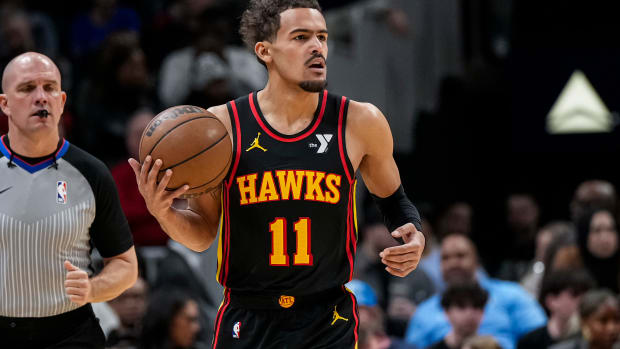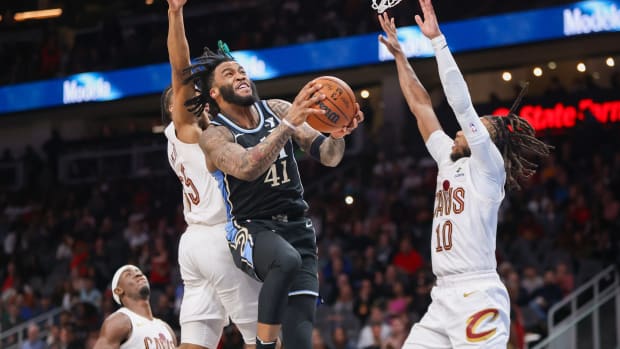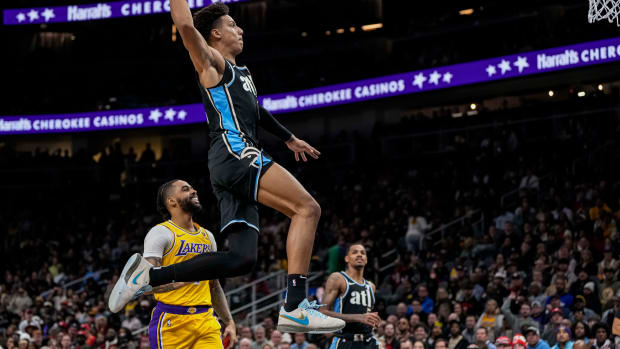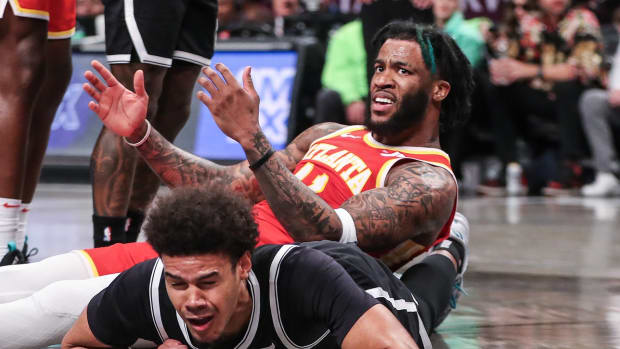Hawks Mock Offseason: Who Should Atlanta Target This Summer?
The Hawks have a pivotal offseason coming up, even if they still don’t have a clear idea of when it will happen. How the novel coronavirus and resulting suspension of play will affect the 2020-21 season remains to be seen, but the upcoming year will be crucial for Atlanta all the same.
The team has professed its intentions of making the playoffs next season, which seems like a bold declaration for a team situated near the bottom of the Eastern Conference standings. But competing for a playoff berth isn’t entirely unrealistic for a young team on the rise with an elite offensive centerpiece already in place -- so long as Atlanta makes the right decisions this summer.
The Hawks will try to thread a tight needle by signing players capable of contributing in 2021 but still young enough to grow with the rest of the team’s core beyond then. Those sorts of players are hard to find and will be in high demand given the weak 2020 free-agent class and the number of teams who could realistically expect to sniff the playoffs in both conferences.
Currently projected to have $49 million in cap space, Atlanta will enter the 2020 offseason with the most spending money of any team in the NBA. (The salary cap is currently projected at $115 million, but that could drop due to coronavirus-related revenue losses and thus cut down on available cap space across the league. No matter the exact amount, the Hawks will have the most space no matter what.) It’s unlikely Travis Schlenk uses the bulk of that space to take on overpriced veterans and draft assets -- as he did last year -- due to the improved talent on the roster and the team’s heightened aspirations for next season. Combined with the dearth of free agents who would justify a max contract, the Hawks’ greatest advantage this summer could be their ability to outbid rivals on starting- and rotation-level players rather than lure star free agents to Atlanta.
They’ll be able to offer short-term deals with high annual salaries or longer deals with lower per-year prices, depending on the free agent, which gives the Hawks flexibility in how they can build out their roster. We can’t know exactly how players will approach free agency or what they’ll prioritize when signing their next deal, which makes it impossible to project the offseason with much certainty. We can, however, identify areas of need and realistically-attainable players who might help address them.
(A huge thanks to the great Jeff Siegel and his awesome website, Early Bird Rights, for assisting with the financial mechanics of this exercise.)
Projected Cap Space: $49,077,106 (Subject to change, depending on revenue losses)
Projected Space Below the Tax: $74,970,191 (Subject to change, depending on revenue losses)
Players Under Contract for 2020-21: 11 (Including 2020 first- and second-round picks)
Roster Needs: Shooting, secondary playmaking, wing defensive versatility
Joe Harris
Two years, $27 million (Signed using cap space)
Harris will be one of the most coveted shooters on the market, and with most of Brooklyn’s core under contract for next season and the Nets brushing up against the luxury tax, he may not be long for his current team if he commands a significant raise. The 28-year-old has been one of the NBA’s best marksmen since he arrived in Brooklyn, shooting nearly 43 percent on five 3-point attempts per game. His ability to shoot off of movement and set himself up for open looks without the ball gives him a kind of gravity that the Atlanta’s offense lacked last season, and he’s a good enough ball-mover and decision maker to capitalize on the pressure he applies to defenses.
The Hawks can offer Harris a steady, important role and are uniquely positioned to outbid competitors if necessary due to their cap space advantage and dire need for shooting. It’s tough to project Harris’ market this summer; he made $16 million over two years on his last deal and stands to collect more on his next one, but it’s unclear how high bidders will go to acquire him. That could either result in his next team -- which could still be the Nets -- getting him on a bargain deal or having to overpay him slightly. Given his skills and Atlanta’s needs, the Hawks would likely be glad to do either.
Moe Harkless
One year, $14 million (Cap space)
The 27-year-old Harkless probably won’t be worth $14 million annually over multiple years, but that price is more palatable on a one-season balloon deal with a short-term payoff. With 33 playoff games already under his belt and in the middle of his prime, Harkless is exactly the kind of player Schlenk and Lloyd Pierce have identified as a desirable free-agency target. On defense, he’d give the Hawks the closest thing they’ll find to a wing stopper and the versatility to slot into several different lineup configurations. That would take pressure off of Atlanta’s young wings -- namely De’Andre Hunter and Cam Reddish -- who wouldn’t have to take on primary defensive roles alone with the smart and rangy Harkless around.
He has been inconsistent from beyond the arc the last few years, but Harkless has shot the ball well at various points in his career and does enough little things on offense to fit in despite his shooting limitations. He’s a smart cutter and off-ball screener with experience playing alongside a star point guard with deep shooting range. Harkless flashed increased capability off the bounce in 12 games with the Knicks, but doesn’t require the ball to be effective on offense, making him a clean theoretical fit in Atlanta’s star-driven offense.
Harkless might prefer the security of a longer deal or the chance to play for a contender on a lower salary over a single-season payout with the Hawks. If that’s the case, the Hawks could try to pivot to a sharpshooter like Dāvis Bertāns with an even richer one- or two-year deal. It’s tricky to project this range of the market, but Harkless feels like a reasonable target for a team in Atlanta’s position.
Garrett Temple
Two years, $11 million (Cap space)
Temple’s free agency is contingent upon the Nets declining his $5 million team option, and it may be a stretch projecting the 34-year-old to sign on at the same price for a marginal role with a rebuilding team. But while the veteran guard theoretically offers a nice blend of shooting, facilitation, and on-ball defense, his play over the last two seasons may not warrant significant money or playing time. Temple shot just 33 percent from beyond the arc over his last two seasons and was roughly as efficient as Cam Reddish offensively last year (though he was more consistent over the course of the season).
Still, if Temple’s jumper bounces back, he could be a useful presence on the back end of Atlanta’s rotation and in its young locker room. He’s as professional and sage a veteran as the NBA has -- one of Pierce’s preferred qualities -- and can plug cleanly into most any lineup. He won’t be asked to run second units, but Temple handles the ball well enough to facilitate shots for others and slot into a spot-up role beside Teague or Young. He was Brooklyn’s primary defensive option against Young last season and won’t compromise his team’s defense with mental errors or lapses in focus.
Brooklyn may value that combination of skills enough to retain Temple, which would take him off the table for the Hawks and any other potential suitor. But in the theoretical universe that is this exercise, the veteran is a suitable final piece of Atlanta’s offseason.
Jeff Teague
Two years, $10 million (Cap space)
Atlanta would have to renounce Teague’s Bird rights in order to reach $49 million in cap space -- a no-brainer given Teague’s massive $28.5 million cap hold -- which means it would have to use cap space or an exception to retain him. No issue here. The Hawks are still flush with space, Teague has expressed a desire to stay in Atlanta, and a multiyear deal with a $5 million annual salary feels fair for a useful, but declining, veteran backup point guard.
Teague had just begun to get comfortable piloting second units when the season halted, and his brand of unexciting yet competent playmaking provided a huge lift for a previously lifeless bench offense. He dished nearly seven assists per 36 minutes last season, and while Teague has lost a step since his younger, speedier days in Atlanta, he still has the downhill burst to collapse defenses and set up teammates. His aversion to open jumpers often came at the expense of offensive flow, and without that quick first step, Teague often passed up shots to ultimately go nowhere.
Still, Teague remains a suitable backup point guard who can lead second units and occasionally share the floor with Trae Young. For the 12-18 minutes he’ll likely play, Atlanta doesn’t need much more than that.
Readers might be surprised to see Fred VanVleet’s name absent from the updated roster, but I’m lower on his fit in Atlanta and he could have more alluring destinations on the table. Bertāns would likely be more expensive and more essential to his incumbent team than Harris, and with John Collins firmly situated as the Hawks’ starting power forward, the Hawks could reach a point of diminishing returns with Bertāns on a hefty deal. Evan Fournier is a better player overall than Harris, but I valued Harris being elite at something the Hawks desperately need (and being less expensive) more than Fournier’s all-around game.
Restricted free agents like Brandon Ingram and Bogdan Bogdanović didn't feel attainable given the price it would take to wrest them from their current teams. Ingram was an All Star in the West last season at 22, and New Orleans will likely match any offer up to the max to retain him. Sacramento likely wouldn't go quite that high to keep Bogdanović, but it will take a serious offer verging on an overpay to pull the 28-year-old from the Kings' grasp.
John Collins will also be eligible for an extension this summer, but I'd expect the Hawks to hold off on locking him down until he hits restricted free agency in the summer of 2021.
Even after filling four roster spots with nearly $39 million, the (theoretical) Hawks still have roughly $13 million and the room exception to spend. That’s a lot of unused capital, and it wouldn’t be surprising if Atlanta decided to make a splashier move rather signing than a smattering of useful but inexpensive role players. But, assuming Gordon Hayward and Anthony Davis stay with their respective clubs, there likely won’t be a free agent worth anything close to a max contract in 2020, especially if the Hawks intend to be active on the 2021 market. Atlanta only has so many roster spots, and there’s little harm in entering next season with money to spare. The Hawks could also use that leftover space to take on an undesirable contract again, especially if the tax drops significantly and rival teams are forced to shed money.




